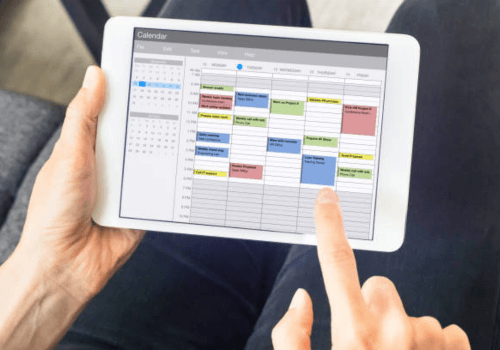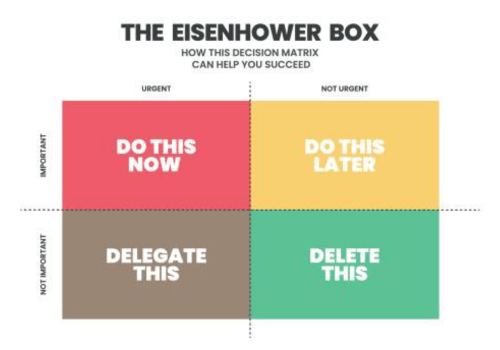6 Effective Time Management Skills Tips
April 04, 2024
Anis

For university students, time management is a critical component of success.
Juggling academic duties, social events, and personal development in a fast-paced setting can be challenging.
This article highlights the time management skills university students should possess to excel academically.
What Is Time Management Skills?
Being proficient in time management is essential for optimizing productivity, reducing stress, and achieving goals.
Identifying tasks, wisely allocating time, and making necessary schedule adjustments are all important aspects of effective time management.
Key time management skills include planning, prioritizing, organizing, allocating time, tracking progress, setting goals, and adaptability.
Hence, developing effective time management skills is a continuous journey that requires self-awareness, dedication, and regular practice.
It involves identifying the most appropriate tools and techniques to match an individual's needs and preferences.
By honing these skills, individuals can improve their daily routines, achieve their goals, and lead a more fulfilling and prosperous life.
6 Time Management Skills Tips
1. Keep a calendar.

Image source: iStock
Forgetting important dates, times, and locations to meet people is common, especially if you don't jot them down somewhere.
If you're not careful, this could result in missing an important exam or appointment.
Fortunately, there's an easy solution to this problem.
You can use an agenda or calendar to help you organize your schedule so you don't have to rely on your memory.
The great thing about this solution is that you can spend a little money on an expensive agenda.
You can opt for a wall calendar, a free schedule from your school, or even online agenda/calendar apps on your phone, which works just as well.
2. Say no to over-commitment.
Engaging in various activities can be beneficial.
It opens doors to meet new people, gain valuable skills, and enhance your professional profile.
As a student, you may often receive requests to participate in councils, clubs or work additional hours at your job.
However, you must acknowledge that you are not obligated to accept every invitation.
Overextending yourself can lead to poor time management.
Considering that there are only 24 hours a day, you need more time on inconsequential commitments to avoid feeling depleted of prioritizing your priorities.
Striving for balance in your responsibilities is climacteric for effective time management.
Remember to allocate some free time for yourself to decompress and ponder.
3. Take a brief break.

Image source: iStock
Make sure to give yourself some downtime to relax and reflect. Sometimes it's easy to lose sight of what you're doing.
Having an overworked, cluttered, and disorganized mind can make you more unproductive in the long run.
Take a breath and spend some time just thinking about returning to your activity or assignment with a clearer and more focused mindset.
4. Prioritize the most important tasks first.
Prioritizing the most significant task of the day helps to increase productivity and achieve smaller tasks with greater ease.
It is advisable to allocate less important tasks, such as responding to emails and messages, to the latter part of the day.
Delaying the completion of a crucial task until the end of the day may lead to increased stress and feeling overwhelmed.
You can apply the Eisenhower Matrix or the Urgent-Important Matrix.

Image source: iStock
It is a powerful tool that helps students prioritize tasks based on urgency and importance.
Divide your to-do list into four quadrants: Urgent and Important, Important but Not Urgent, Urgent but Not Important, and Neither Urgent nor Important.
By implementing this approach, individuals can effectively manage their workload and achieve their goals more efficiently.
Furthermore, focusing on a time-consuming task late in the day may have a detrimental impact on other essential aspects, such as one's sleep schedule.
5. Break tasks into smaller steps.
Another effective strategy for managing tasks is to break them down into more manageable steps.
This approach, known as task chunking, can help individuals better cope with their workload and maintain productivity in their studies or work.
By focusing on smaller goals, individuals can stay on track and avoid feeling overwhelmed by more complex ones.
Therefore, consider incorporating task chunking into your own study or work routine to improve your efficiency and success.
6. Set out time for a task.
Setting a time to study or pursue a hobby can greatly improve time management.
Avoiding the tendency to do things on a whim can become a negative habit.
If you schedule to study from 2 pm to 5:30 pm, stick to that schedule.
This time boundary will aid in your concentration and boost productivity.
After completing your scheduled tasks, you will have free time to do as you please.
To excel academically and enjoy their college journey, university students must hone the art of time management.
This post provides tailored time management techniques that can help students optimize their study habits and reduce anxiety.
It's crucial to note that time management is not a one-size-fits-all solution.
It's a personal expedition of growth and discovery that lays the groundwork for a successful future.
By embracing these time management abilities, they can navigate college life smoothly and unlock their potential for academic achievements.
Kickstart your education in Malaysia
We'll help you find and apply for your dream university
You might be interested in...
- Promoting Health and Well-being: Initiatives by Universities in Malaysia
- Raising Awareness of the Threat of Microplastics Pollution on International Mother Earth Day
- Exploring Distance Learning: Course Offerings at Universities in Malaysia
- The Role of Education in Promoting Health Equity: Lessons from World Health Day 2024
- Navigating Credit Transfers: A Guide for Students Switching Institutions
- Explore the Benefits of Studying in Malaysia After SPM Examination
- SPM Leavers’ Guide to Malaysian Scholarships: Types, General Requirements, and Practical Tips
- Crafting a Greener Tomorrow: Empowering Change through Zero Waste and Upcycling Practices
- Malaysian Higher Education's Global Outreach: Collaborations with International Institutions
- Initiatives by Universities in Malaysia to Prepare Students for Globalization








